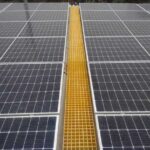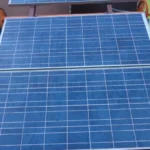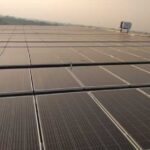How Azimuth Angle Impacts Solar Panel Efficiency for Homes, Industries, and Commercial Buildings
How Azimuth Angle Impacts Solar Panel Efficiency for Homes, Industries, and Commercial Buildings
Designing layout for a solar installation is an expert job and needs to be done with utmost care. There are two important considerations while designing solar panels installation , one is inclination of the panels and another is direction. The angle of tilt should be latitude of the place wherever the installation is being done to optimize the radiation of solar and direction should be true south.
While angle of tilt is easy to control ,the direction is not always possible to be maintained. If the building roof on which solar panels are to be installed is such that structure installation is not possible in true south direction then there is bound to be loss of generation. We have seen a lot of installations where because of paucity of space and ignorance of installer and client the solar plants are installed without giving a thought to tilt & direction and only aesthetic considerations are valued . This way though the client can be impressed but the very purpose of installing solar plant to generate rated power is compromised.
In case it is necessary then also the installer should try and reduce the impact of azimuth . To have a clear picture of loss of generation the following table may be used.
Suggested Articles

Solar Rooftop: अपने घर को बनाओ खुद का पावर हाउस | Complete Guide
सौर रूफटॉप सिस्टम आपके घर को पावर हाउस बना सकता है। यह न केवल बिजली के बिलों में बचत करता है, बल्कि साफ और नवीकरणीय ऊर्जा भी प्रदान करता है। जानें सौर पैनल की इंस्टालेशन प्रक्रिया, लागत, लाभ और कैसे यह आपके घर को आत्मनिर्भर ऊर्जा का स्रोत बना सकता है।

Developers fear unfair state-specific levies will make solar more expensive
Developers in India are concerned that state-specific levies on solar projects could increase costs, slow adoption, and impact the growth of renewable energy across residential, commercial, and industrial sectors.

Latest MNRE List: Approved Solar Module Manufacturers
Check the latest MNRE-approved list of solar module manufacturers to ensure quality and compliance for your solar projects in India.

Complete Guide to Net Metering and Electricity Bill Savings
Learn how net metering lets you sell excess solar energy back to the grid, reducing your electricity bills and maximizing your solar investment.

Sustainable Solar Panel Disposal: Recycling for a Greener Future
Sustainable solar panel disposal ensures old or damaged panels are recycled responsibly, reducing waste and environmental harm. By adopting eco-friendly recycling and reuse practices, we can recover valuable materials, lower carbon impact, and make solar energy truly sustainable from installation to end-of-life.

Rooftop Solar for Factories: Maximum kW You Can Install
Industrial rooftop solar guide: Understand KW capacity limits, installation guidelines, and best practices for factories and manufacturing units

India and Japan Strengthen Renewable Energy Cooperation
India and Japan have initiated a partnership under the Asia Energy Transition Initiative (AETI) to support India’s clean energy transition. India has set an ambitious target of achieving net-zero by 2070, while Japan aims to achieve the same by 2050.

Blame it on Sun! Average Solar PLFs not satisfactory
Explore the reasons behind low average Solar PLFs, from environmental factors to system design, and learn strategies to boost solar plant performance